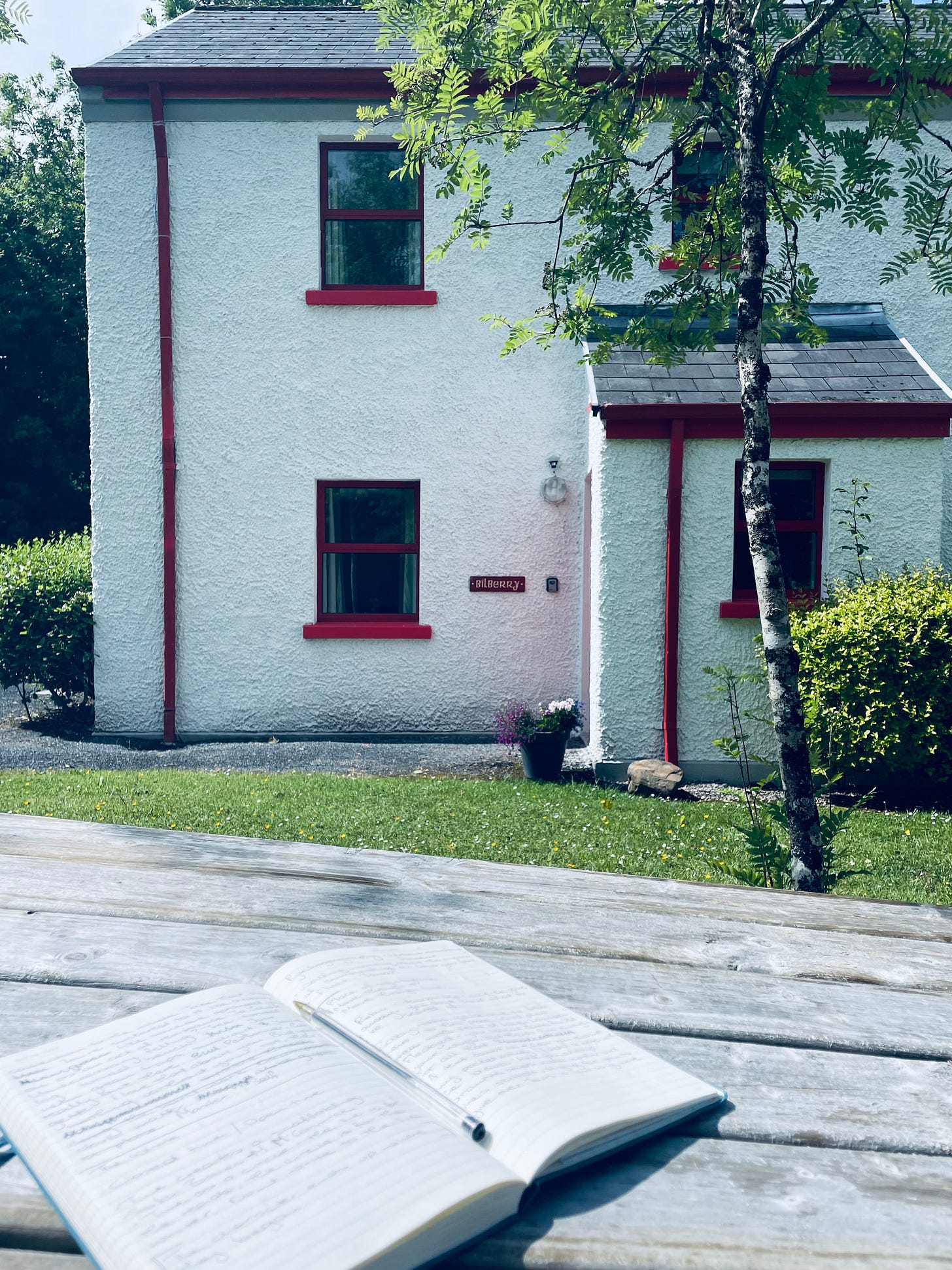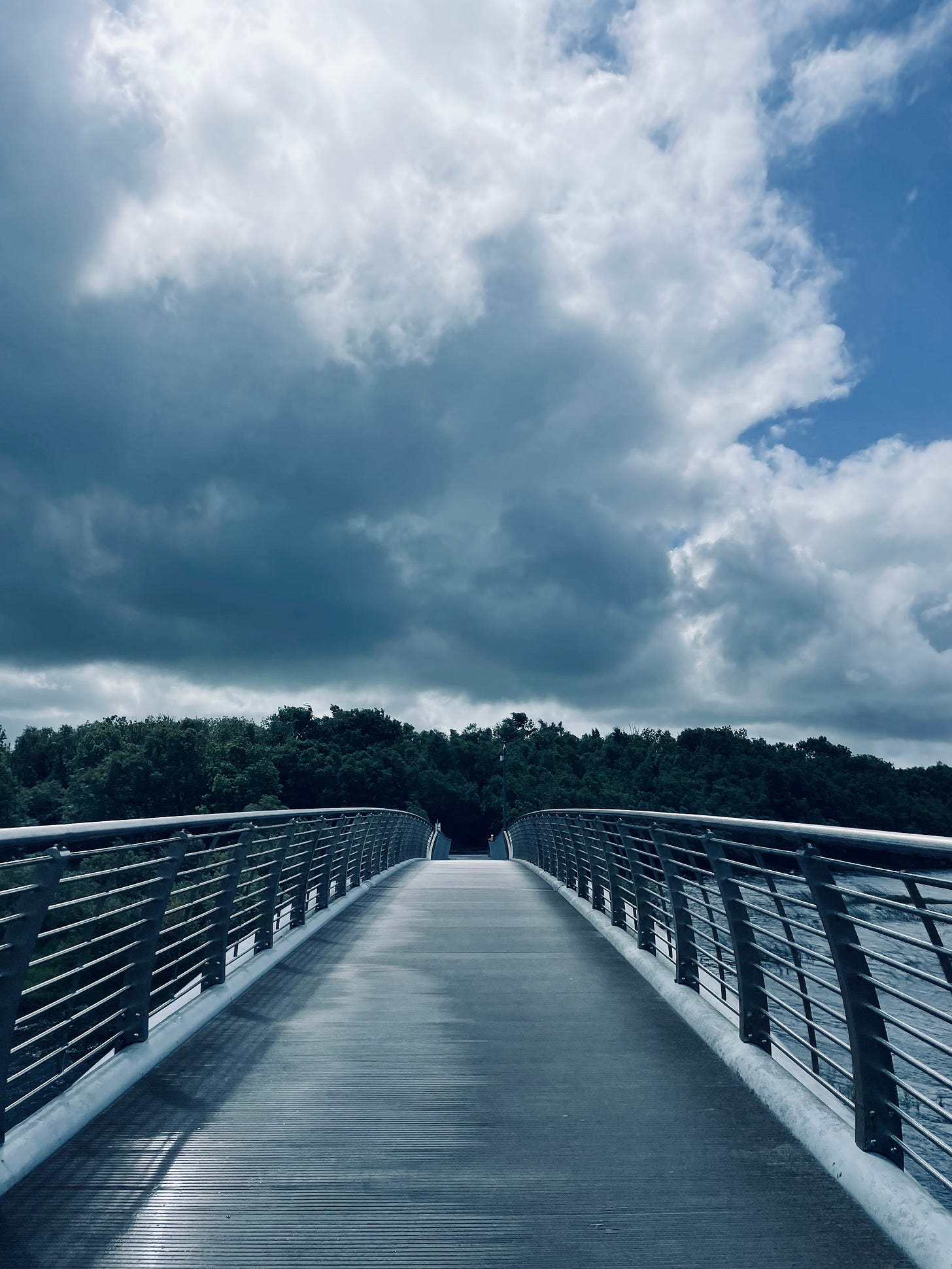It’s Friday night. I’m in the kitchen with three poets. Geoff clears his throat and delivers a piece from memory about his first kiss. It’s electric. Like cold fizz on a hot day - I can’t believe he knows it by heart. His wife, Rachel, goes next, rhyming about a break up, her rhythm so finely tuned I want to start dancing. The other poet and I clap them both, and admit to performance nerves.
“We’ll sort that out this weekend,” Geoff says.
This was my introduction to All Weather Words1, Alice Kinsella’s writing retreat in Castlebar last weekend. I was plunged into the deep end, sharing a cottage with writers of a different discipline who schooled me in the spoken word. It set me on a course of experimentation. Rather than plug away at my next novel, I decided to try something new.
Just Don’t Think About it
The next day, when Alice set prompts, I tried to write without thinking about writing. I have come to the page by an academic route. I have studied the greats, and learned the rules of iambic pentameter. My essays on nineteenth century novels and metaphysical poetry would bore you to tears. Those on post-colonial literature are a bit more ballsy, but still, they’re shaped by the opinions of others. I, like so many others, wrote in the style of so-and-so until I discovered my own voice. And that journey has been an unlearning of all the ways I was taught to conduct myself on paper.
Enter spoken word poets.
In between writing workshops, I watched videos of Colm Keegan, Anna D , Emmet O’Brien, and fellow retreater, Poet Geoff. These inner city artists use poetry as a tool for social change. Geoff told us over breakfast about nipping over to the Dail before work to deliver a piece to camera about homelessness in Dublin. He responded to negativity about his home city by writing This is Dublin our Fair City when the new mural on Dame Street went up. So many of his stories centre around art as revolution - a response to injustice and suffering.
Spoken word has its roots in ancient pre-literate cultures from the Celts to Homer’s epics. It really got going in the 50s and 60s with American beat poets and the Black Art Movement. This was art as a tool of social and political expression. Over breakfast, someone talked about Charles Bukowski, and read this aloud:
The Laughing Heart
your life is your life
don't let it be clubbed into dank submission.
be on the watch.
there are ways out.
there is a light somewhere.
it may not be much light but
it beats the darkness.
be on the watch.
the gods will offer you chances.
know them.
take them.
you can't beat death but
you can beat death in life, sometimes.
and the more often you learn to do it,
the more light there will be.
your life is your life.
know it while you have it.
you are marvelous
the gods wait to delight
in you.
Then I went off to research Hazel Hogan, and watched everything I could find of her performances. She says: ‘if there's one thing you take from these words it's this: people from our history proved it's okay to disobey it's possible to pave another way.’
I am not from Dublin. Those are not my stories to tell. But I have other things: colonialism, religion, motherhood, and wild, untameable nature. So, I dabbled in a more conversational style of verse, one written to be spoken, not read. I shied away from esoteric themes and kept it sparse. I didn’t overthink.
Nesting
On Saturday evening, after a morning of workshops, and an afternoon to work alone, we gathered to share our work. When my turn came, I told the room how nervous I was and thought, for one awful moment, that I might cry. If you have ever taken a writing class, you will know the beautiful moment when artists call you out with encouragement, and how much good it does the soul. I shared, everyone clapped, and I felt amazing. Later, we went for dinner and talked about the highs and lows of a creative calling.
On the second morning, Alice found a baby wren her cats had dragged in. She put it somewhere safe, gave it food, and kept the cats from the room until it could find its wings. It became, for me, a metaphor for the weekend. Alice facilitated a generous space, fed us with hard-earned wisdom, and sent us back into the world that little bit lighter, that little bit more confident. Because it’s not easy being a writer, you know.
By Heart
Our final exercise was to dodge rainclouds around Lough Lannagh and consider psychogeography - the emotional and psychological impact of our environment on our behaviour. I crossed the footbridge, past a nest of willow warblers clamouring to be fed, and up the hill where a plum tree offered shelter from the rain.
I watched a fledgling robin clamour to be fed. It was downy and defenceless, flapping like mad - drawing attention to itself. A text came in from my son: Can you Revolut my pocket money? It was all the material I needed for a poem.
One of the poets said performance poetry was like play. I love that. The dance between channelling rage and holding things lightly. Fury and fun. I wrote a few pieces over the weekend that feel like the start of something. They’re a bit raw. The advice was to let them sit. Take a bit of heat out of them. Perhaps I’ll share them when they’re ready.







Saw your post thought this might resonate - I serve the song beneath the traps—the bass that bombings couldn’t own. https://thehiddenclinic.substack.com/p/what-i-found-in-the-smoke-that-the
I love your openness to something new. Looking forward to hearing the (Alps inspired?)poetry.